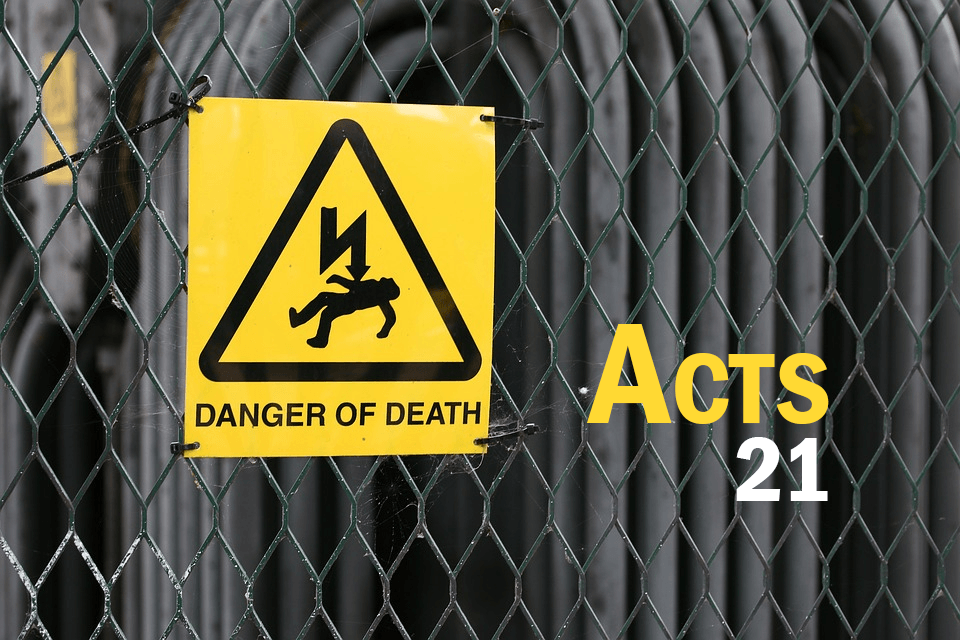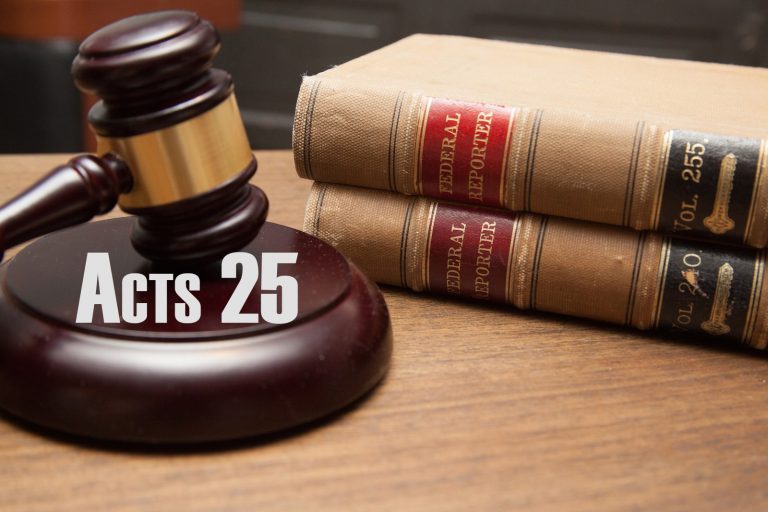Paul Goes to Jerusalem
21 And when we had parted from them and set sail, we came by a straight course to Cos, and the next day to Rhodes, and from there to Patara. And having found a ship crossing to Phoenicia, we went aboard and set sail. When we had come in sight of Cyprus, leaving it on the left we sailed to Syria and landed at Tyre, for there the ship was to unload its cargo. And having sought out the disciples, we stayed there for seven days. And through the Spirit they were telling Paul not to go on to Jerusalem. When our days there were ended, we departed and went on our journey, and they all, with wives and children, accompanied us until we were outside the city. And kneeling down on the beach, we prayed and said farewell to one another. Then we went on board the ship, and they returned home.
When we had finished the voyage from Tyre, we arrived at Ptolemais, and we greeted the brothers and stayed with them for one day. On the next day we departed and came to Caesarea, and we entered the house of Philip the evangelist, who was one of the seven, and stayed with him. He had four unmarried daughters, who prophesied. While we were staying for many days, a prophet named Agabus came down from Judea. And coming to us, he took Paul’s belt and bound his own feet and hands and said, “Thus says the Holy Spirit, ‘This is how the Jews at Jerusalem will bind the man who owns this belt and deliver him into the hands of the Gentiles.’” When we heard this, we and the people there urged him not to go up to Jerusalem. Then Paul answered, “What are you doing, weeping and breaking my heart? For I am ready not only to be imprisoned but even to die in Jerusalem for the name of the Lord Jesus.” And since he would not be persuaded, we ceased and said, “Let the will of the Lord be done.”
After these days we got ready and went up to Jerusalem. And some of the disciples from Caesarea went with us, bringing us to the house of Mnason of Cyprus, an early disciple, with whom we should lodge.
Paul Visits James
When we had come to Jerusalem, the brothers received us gladly. On the following day Paul went in with us to James, and all the elders were present. After greeting them, he related one by one the things that God had done among the Gentiles through his ministry. And when they heard it, they glorified God. And they said to him, “You see, brother, how many thousands there are among the Jews of those who have believed. They are all zealous for the law, and they have been told about you that you teach all the Jews who are among the Gentiles to forsake Moses, telling them not to circumcise their children or walk according to our customs. What then is to be done? They will certainly hear that you have come. Do therefore what we tell you. We have four men who are under a vow; take these men and purify yourself along with them and pay their expenses, so that they may shave their heads. Thus all will know that there is nothing in what they have been told about you, but that you yourself also live in observance of the law. But as for the Gentiles who have believed, we have sent a letter with our judgment that they should abstain from what has been sacrificed to idols, and from blood, and from what has been strangled, and from sexual immorality.” Then Paul took the men, and the next day he purified himself along with them and went into the temple, giving notice when the days of purification would be fulfilled and the offering presented for each one of them.
Paul Arrested in the Temple
When the seven days were almost completed, the Jews from Asia, seeing him in the temple, stirred up the whole crowd and laid hands on him, crying out, “Men of Israel, help! This is the man who is teaching everyone everywhere against the people and the law and this place. Moreover, he even brought Greeks into the temple and has defiled this holy place.” For they had previously seen Trophimus the Ephesian with him in the city, and they supposed that Paul had brought him into the temple. Then all the city was stirred up, and the people ran together. They seized Paul and dragged him out of the temple, and at once the gates were shut. And as they were seeking to kill him, word came to the tribune of the cohort that all Jerusalem was in confusion. He at once took soldiers and centurions and ran down to them. And when they saw the tribune and the soldiers, they stopped beating Paul. Then the tribune came up and arrested him and ordered him to be bound with two chains. He inquired who he was and what he had done. Some in the crowd were shouting one thing, some another. And as he could not learn the facts because of the uproar, he ordered him to be brought into the barracks. And when he came to the steps, he was actually carried by the soldiers because of the violence of the crowd, for the mob of the people followed, crying out, “Away with him!”
Paul Speaks to the People
As Paul was about to be brought into the barracks, he said to the tribune, “May I say something to you?” And he said, “Do you know Greek? Are you not the Egyptian, then, who recently stirred up a revolt and led the four thousand men of the Assassins out into the wilderness?” Paul replied, “I am a Jew, from Tarsus in Cilicia, a citizen of no obscure city. I beg you, permit me to speak to the people.” And when he had given him permission, Paul, standing on the steps, motioned with his hand to the people. And when there was a great hush, he addressed them in the Hebrew language, saying:
(ESV)
Acts 21 Commentary
by Brad Boyles
This was a tough chapter for me. We read that the voice of the Holy Spirit is speaking through these believers and giving warnings to Paul of what he will face in Jerusalem. Yet, he continues forward to where he feels he’s being called despite these objections. What is going on? Was the Spirit really speaking through these believers? Did they not hear clearly? It’s difficult to reconcile because on the surface it seems like a contradiction.
Paul’s fellow believers give him warnings in two different places over this chapter.
After looking up the disciples, we stayed there seven days; and they kept telling Paul through the Spirit not to set foot in Jerusalem.
Acts 21:4 NASB
As we were staying there for some days, a prophet named Agabus came down from Judea. 11 And coming to us, he took Paul’s belt and bound his own feet and hands, and said, “This is what the Holy Spirit says: ‘In this way the Jews at Jerusalem will bind the man who owns this belt and deliver him into the hands of the Gentiles.’” 12 When we had heard this, we as well as the local residents began begging him not to go up to Jerusalem.
Acts 21:10-12 NASB
Paul’s response to these warnings is, “I’m going anyway.” And that’s exactly what he does. Despite all the warnings and objections, he walks right into Jerusalem. Just like the Spirit had warned, he is beaten, arrested, and hauled away like a prisoner. So we ask ourselves, was Paul wrong? Was he too prideful in going, or was he supposed to be a fearless example to his fellow believers?
If we read the text closely, we can observe that the Holy Spirit does not specifically prohibit Paul from going to Jerusalem. He only warns him of what will happen if he does. This is a stark contrast to several chapters prior (Acts 16) where the Holy Spirit blocks Paul from traveling to Asia. So, this brings us to an even more difficult question. Are we brave enough to follow through with what God has called of us even after we know the consequences?
Sometimes God answers dangerous prayers in unexpected ways. We pray for peace and He places us in a storm. We pray for patience and He allows our last nerve to be tested. We pray for growth and into the fire we go! But when we have the peace of God, all those warnings don’t matter.
Paul was setting a standard for those who were following Christ. He was preparing them, much like Jesus prepared the disciples, to face the fear of persecution and suffering for the Lord’s name. Paul is a living example of faith in action. His life testifies to the fact that even though God has told him what is coming, he will still go. It’s the exact same response we see from Jesus when he is led to the cross. In Matthew 16, Peter was disgusted when Jesus foretold of his death and suffering. Jesus responded by equating Peter’s response to the mindset of Satan who is opposed to the will of God. Jesus had peace. Peter didn’t.
It’s really a mind-blowing thought. Do we really see the will of God? Or an even bolder question is, do we really want to follow through with it? Paul did. He left a legacy of following. He poured himself out to the Lord. He used every ounce of his being to bring glory to the name of Christ. When the path marked by God is a path marked with suffering, will you relentlessly follow?




